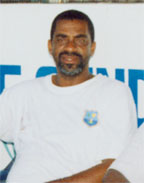There is a familiar figure among the travelling entourage of support staff with the West Indies team in New Zealand.
Clyde Butts, almost as trim at 51 as he was during a career in the 1980s in which his off-spin earned him seven Tests and 348 first-class wickets for Guyana and the West Indies, is here in his capacity as convenor of selectors.
“The board has decided to revert to its policy of sending one selector on overseas tours,” he said as he cast an eye over net practice prior to the second Test here, “Robert Haynes was in Toronto in August (for the series with Canada and Bermuda) and I’m here.”
Butts explained that his mission was more than observing “how the players score runs and get wickets.”
“It’s their behaviour patterns on tour, how they fit into a team environment, how they adapt to various situations in the middle and to different conditions that are as important,” he said.
Butts is also convenor on tour. The other selectors are captain Chris Gayle, vice-captain Denesh Ramdin and head coach John Dyson. Together, they pick the starting 11.
He declared himself “quite satisfied” with what he has observed of the team in New Zealand.
“They (the players) seem committed and, at the same time, relaxed and in good spirits,” he said. “I can sense they enjoy each other’s company and that makes for a united team.”
He was especially impressed with how they handled the bitter cold and damp of the drawn, weather-beaten first Test in Dunedin and fought their way out of first innings difficulties.
While victory in the second Test starting at McLean Park here today (overnight east Caribbean time) would be an important boost for West Indies cricket, Butts acknowledged that there are a host of problems to be sorted out at regional level for the climb up the International Cricket Council (ICC) to be maintained.
One was the low overall playing standards.
He was in Guyana for the early part of the regional one-day tournament last month that was devalued by the inclusion of weakened teams from Canada and the United States.
“The standards were not what you wanted to see,” he stated. “You want to see players competing against the best teams and being able to showcase their talents at the highest level.”
He is hopeful that the expanded, home-and-away itinerary for the 2009 Carib Beer Cup first-class season and its dovetailing with the Tests against England achieves its objective.
“It’s good for our cricket, it’s good for our cricketers,” he said. “It gives them the opportunity once the Test tour is on to know that they’re not out of the loop, that once they get uns and wickets, the selectors will look at them.”
In addition, any one who is left out of the Test team gets the chance to continue playing in the Carib tournament and be competitive.
“What happened in the past was that we couldn’t know the form of players we wanted to include or to bring back just because they weren’t,” he noted.
Butts also stressed the need for improved pitches.
“We talk about our spinners getting wickets in regional cricket and of course they will because the pitches help them,” he said.
“The problem is that when they get into up to Test level, they find the pitches are better prepared and we see their limitations,” he noted.
“They can get away with bad deliveries in our Carib cricket but not in Tests. The batsmen don’t get to play the shots they do on good, even pitches.”
The last selector to go on an overseas tour was Sir Viv Richards, then chairman, to South Africa in 2003-04.
Butts replaced him on the panel when he resigned a few months later and took over as convenor from Gordon Greenidge earlier this year.

Haynes, the former Jamaica leg-spinner and team coach, and Raphick Jumadeen, one-time Trinidad and Tobago left-arm spinner, came in for Greenidge and Andy Roberts, two stars of the great team of the 1980s.
